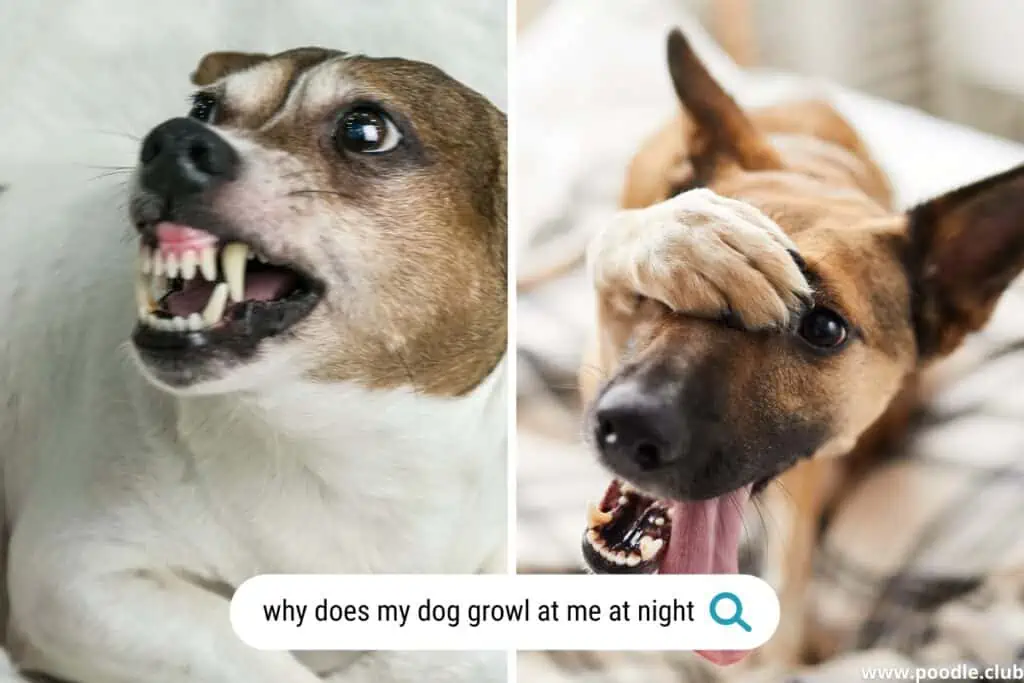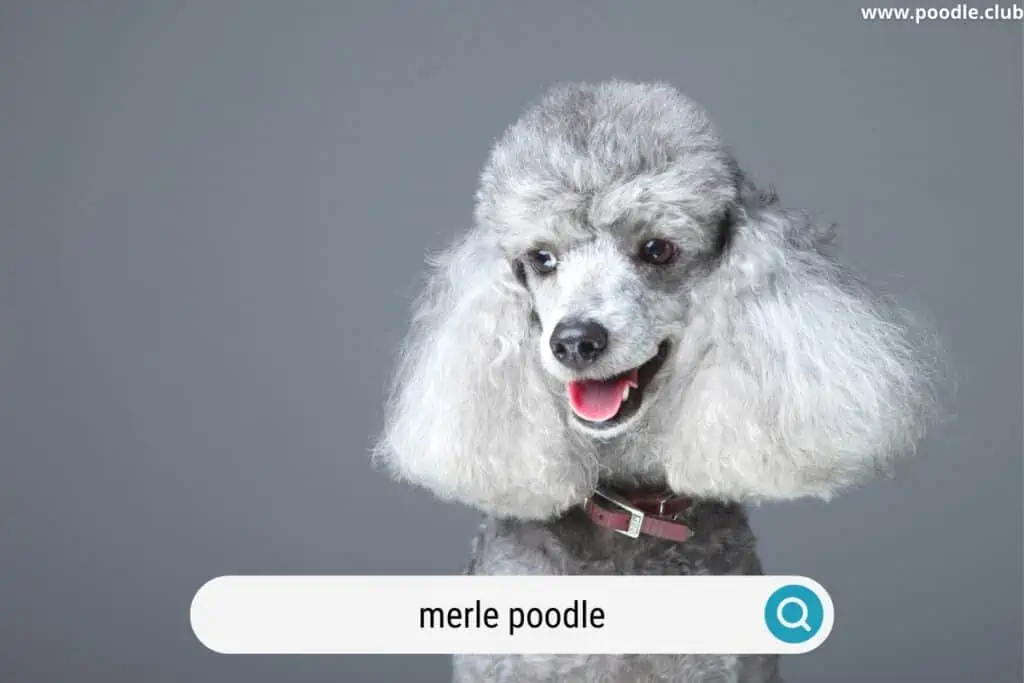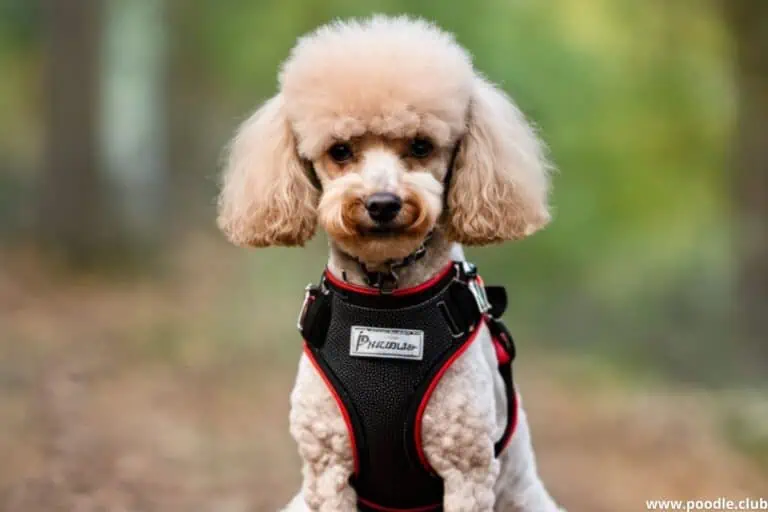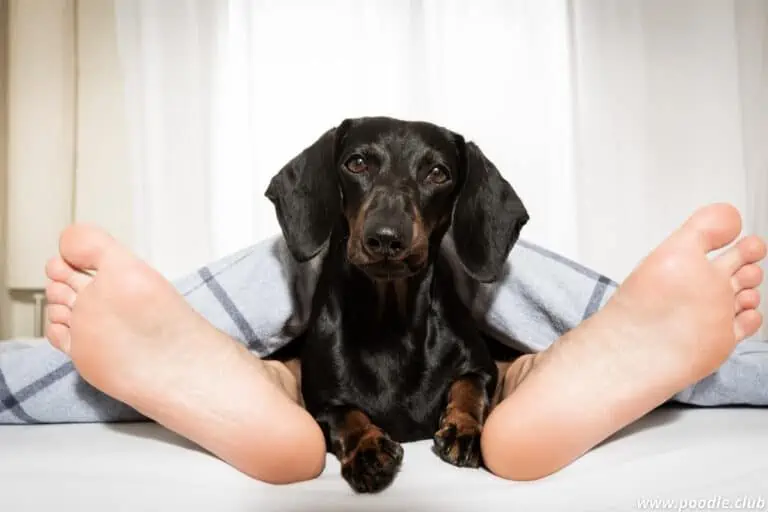Why Does My Dog Growl At Me At Night? [Mystery Behavior]
Dog owners often wonder why their beloved pets growl at night, and understanding the reasons behind this behavior can help address the issue effectively. There are several possible factors that can contribute to a dog’s nighttime growling, and being aware of them can provide insight into your pet’s needs and emotions.

Common reasons for a dog growling at night include bad dreams, fear, anxiety, pain, or loneliness, among other triggers. Factors such as sleep aggression, dementia, loud snoring, and unusual sounds in the environment may also contribute to this behavior.
As you dive into this article, you will discover the various causes of nighttime growling in dogs and learn how to respond appropriately to ensure your pet’s well-being and your own peace of mind.
Why Dogs Growl
Dogs growl at night for various reasons, including having bad dreams, hearing strange noises, feeling threatened, and experiencing anxiety or pain. Understanding the cause behind your dog’s growling can help you address the issue and improve their well-being.
Bad dreams are a common reason for nighttime growling. When dogs sleep, they might have nightmares that can cause them to growl or even jump up suddenly. To help your dog sleep more soundly and reduce the occurrence of nightmares, consider offering them calming aids or treats before bedtime.
External factors, such as hearing weird sounds, loud snoring, or unfamiliar people, can also cause dogs to growl at night. Growling in response to these stimuli is a way for your dog to show they are scared, alert, or trying to protect their territory.
Another possible reason for growling at night is anxiety. Separation anxiety, generalized anxiety, and other forms of anxiety can all contribute to nighttime growling. In some cases, dogs growl in reaction to pain or the onset of dementia. How can you address these potential explanations? Consulting a veterinarian can be an essential first step in determining an appropriate treatment plan for your dog’s anxiety or health concerns.
PuppySpot is a reputable dog marketplace where you can browse and find compatible puppies right from the comfort of your home. They have placed over 200,000 puppies into homes in the US!
Common Reasons for Nighttime Growling

Fear and Anxiety
One major cause of nighttime growling in dogs is fear and anxiety. Dogs can become anxious for various reasons, including separation from their owners, unfamiliar environments, or past traumatic experiences. This anxiety can manifest in several ways, such as growling at night when they feel threatened or insecure.
Discomfort and Pain
Another reason why dogs may growl at night is due to discomfort or pain. If your dog is experiencing any physical discomfort, such as joint pain or an injury, they might growl when they’re trying to find a comfortable position to sleep or when they’re in pain.
It is essential to monitor your dog’s health and consult with a veterinarian if you suspect they are in pain.
Protectiveness and Territoriality
Dogs are naturally protective of their home and their family, which can lead to growling at night in response to perceived threats. This can be triggered by unfamiliar sounds, scents, or even the presence of wild animals or intruders near the property.
To address this issue, consider implementing safety measures such as secure fencing, gates, and proper outdoor lighting.

Disturbances and Noises
One more reason for nighttime growling could be disturbances, like hearing weird sounds, loud snoring, or sudden noises that can startle your dog. By identifying and minimizing these disturbances, you may help reduce your dog’s growling at night. Additionally, providing your dog with a safe, comfortable, and quiet sleeping environment can help alleviate their nighttime growling.
How to Address Nighttime Growling
Creating a Comfortable Environment
Ensuring your dog has a comfortable and safe sleeping area can help reduce nighttime growling. Create a cozy space with a soft bed or crate, and remove any potential stressors from the vicinity, such as loud noises or bright lights. Additionally, maintaining a consistent sleep schedule can help your dog feel more at ease.
Providing Adequate Exercise and Mental Stimulation
Physical activity and mental stimulation throughout the day can tire out your dog, reducing the likelihood of nighttime growling.
Engage in regular exercise sessions like walks or playtime, and provide puzzle toys or interactive games to keep your dog mentally satisfied. A well-exercised and engaged dog is less likely to be restless or anxious at night, potentially decreasing aggressive behaviors.
Behavior Modification and Training Techniques
Addressing your dog’s growling through behavior modification and training techniques can be an effective way to curb nighttime aggression.
Using a crate or kennel to establish boundaries and prevent growling on the bed. Additionally, work on positive reinforcement training methods to teach your dog appropriate behaviors around bedtime, such as rewarding calm and quiet behavior.
It’s important to remember that growling is a form of communication for dogs, and understanding the triggers behind this behavior can be essential in successfully addressing it. Understanding the situational factors that cause your dog to growl can help in determining the best approach to modifying the behavior.

When to Seek Professional Help
If your dog’s nighttime growling is accompanied by other signs of aggression, such as lunging, snapping, or biting, it is essential to get help from a professional dog trainer or behaviorist. Understand that growling during play does not necessarily indicate aggression; context and body language are crucial factors to consider when assessing your dog’s behavior.
Dogs might also growl at night due to tension, frustration, pain, or fear. In these cases, it is important to address the underlying issue. Consider seeking professional help if:
- Your dog’s nighttime growling is consistent or intensifying
- Attempted training or behavior modifications have not led to improvements
- The growling poses a risk to your safety or other household members
- You are unsure about the cause or how to handle your dog’s behavior
Moreover, a veterinary consultation is crucial if you suspect that your dog’s growling is due to pain or an underlying medical condition. Remember, dog behavior experts might be able to offer guidance, but only a veterinarian can diagnose and treat health issues.

Conclusion
In the end, there are several reasons why a dog may growl at night. Anxiety is often the primary cause, but other factors such as loneliness, fear, territorial instincts, and frustration may also play a role in this behavior. Understanding these reasons can help dog owners take appropriate action to address the issue.
It is essential to ensure your dog feels secure and comfortable in its environment by providing adequate training, socialization, and mental stimulation. Properly addressing a dog’s anxiety, fear, or other concerns can help prevent nighttime growling and contribute to a more peaceful and restful environment for both the dog and their owner.
Additionally, it is crucial to monitor your dog’s behavior and consult with a professional if necessary, as they may be able to identify any underlying issues that could be causing the nighttime growling.
In summary, being attentive to the needs of your canine companion and addressing their concerns can lead to a harmonious, and growl-free bedtime routine for your beloved pet.



![Do Poodles Like Children? [Poodle Kids Guide]](https://poodle.club/wp-content/uploads/2022/12/pasted-image-0-768x512.webp)

![What is a Merle Poodle [Explained]](https://poodle.club/wp-content/uploads/2022/12/what-is-a-merle-poodle-768x512.webp)

